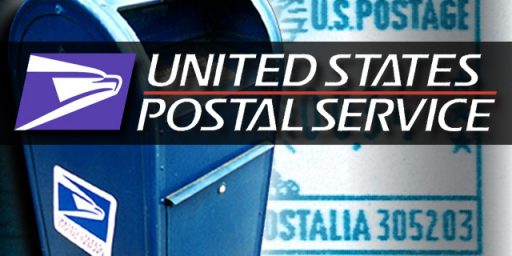Privatizing The Post Office Is The Only Way To Save It
We are being warned once again that the Postal Service is on the verge of financial collapse. There really is only one solution.
In addition to all our other financial problems, we may soon see the United States Postal Service defaulting on its debts:
The U.S. Postal Service announced Friday that it had racked up a $3.1 billion quarterly loss and that if current trends continue it is likely to default on its payments to the federal government.
The USPS continues to suffer from falling mail volume. During the third quarter this year, USPS delivered a total of 39.8 billion items, a decline of 2.6 percent compared to the 40.9 billion items delivered during the same period last year, the Associated Press reported.
According to current revenue estimates, the postal service will be unable to make a $5.5 billion payment to its retirement fund that is due in September. Unless Congress takes action, such as waiving the payment, the postal service says that it will have no choice but to default on its payments.
As consumers increasingly rely on electronic communications instead of “snail mail,” the USPS has seen a serious drop off in demand, and it continues to struggle to adjust to the shift that has occurred during the past decade.
“We continue to take aggressive actions to reduce costs and bring the size of our infrastructure into alignment with reduced customer demand,” Postmaster General and CEO Patrick Donahoe said in a statement.
The solution here seems rather obvious. The Postal Service should be set free of its ties to the Federal Government and forced to compete with other companies. It is fundamentally absurd that they should need to go to Congress to get permission to do something like eliminating Saturday delivery. A private company doesn’t need to get permission to engage in a cost-cutting move like that, and USPS would clearly, in the long run, be a much healthier company if it had the freedom to make these kinds of decisions with the heavy hand of Congress interfering (there’s already been talk about Congress stepping to prevent the Post Office closures that were recently announced). Postal privatization has been done in other countries, quite successfully, and I don’t see any reason why it can’t happen here.
Ted DeHaven wrote about privatization of the mail last week at The Daily Caller:
Postal management is attempting to head off the inevitable congressional interference by creating “Village Post Offices” in the communities affected by the closings. Local businesses, such as pharmacies and grocery stores, would be allowed to offer postal products and services. This makes sense because whereas post offices used to generate almost all postal retail revenue, 35 percent is now generated through alternative channels like USPS.com, self-service kiosks and private stores.
Closing post offices is a small step towards cutting costs and “rationalizing” the retail network, which the USPS management recognizes as critical. However, that won’t be enough to overcome economic reality — let alone the control freaks in Congress. Ultimately, if the USPS is to continue operating like a business instead of becoming just another taxpayer-funded bureaucracy, Congress is going to have to hand the reins over to the private sector. That means privatizing the United States Postal Service.
Two bills have been introduced to reform the Postal Service since its plea for help. One proposed bill, the Postal Reform Act, is sponsored by Rep. Darrell Issa. Option two, the United States Postal Service Pension Obligation Recalculation and Restoration Act of 2011, is sponsored by Rep. Stephen Lynch.
Paralleling the debt ceiling debate, Rep. Issa proposes true reform and cost-saving measures. Rep. Lynch’s bill is an accounting gimmick, similar to the “budget cuts” from Budget Control Act.
Issa’s reform leads to cuts in services, post office locations, and employees. These cuts will prevent a taxpayer-funded federal government bailout of USPS. In his words, Issa’s bill “encourages USPS to modernize its retail network and enables USPS to act more like a business.” As seen in the debt ceiling debacle, true cost-savings and straying from the status quo may be politically unfeasible.
Rep. Lynch’s bill extends USPS’s ability to accumulate debt, which will likely lead to a taxpayer bailout. Lynch makes convoluted claims of USPS over-payment of retirement obligations, which were put in place because of USPS’s fiscal liabilities and monopoly status. Rep. Lynch comments on the stringent obligations of USPS: “H.R. 1351 would correct the Postal Service’s overpayment to the federal government of both its Civil Service Retirement System and Federal Employee Retirement System obligations, which is collectively in the range of $60 to $80 billion, providing the Postal Service with an opportunity to find long-term solutions. In light of today’s announcement, we call on our Republican colleagues on the Oversight Committee to give this legislation prompt consideration.”
Issa’s bill is marginally better than Lynch’s, but neither one of them deals effectively with the real cause of the Postal Service’s problems, it’s government protected monopoly. Thanks to that monopoly, USPS not only finds it difficult to react to changes in the market because of the political implications of the decisions that it makes, but it has no incentive to do so until its absolutely too late like it is now. Consumers have found a way around that monopoly by essentially voting with their feet. Electronic payments mean that fewer people mail checks anymore. E-mail, Facebook, and Twitter mean that you don’t need to send a letter or a card to stay in touch with friends and family. The World Wide Web, and now tablet computing, have made paper magazines somewhat obsolete. At this point, the USPS’s first class mail system is little more than a vast junk mail delivery system. I don’t know about anyone else, but the average day most of what ends up in my personal mailbox gets thrown away immediately. And I rarely even bother to check my mailbox on Saturdays.
Privatizing the Post Office won’t prevent the changes in technology that are making mail delivery less relevant but they would allow USPS, or its successor, to respond more rapidly, and more creatively to those changes without having to please the political overlords on Capitol Hill. Privatize the mail, it may be the only way to save it.







The only answer to this that I’ve seen from some governments has been… to tax email. These people are obscene.
You want the USPS to be competitive with private companies? Free it of its requirement to deliver mail to every American, no matter where they live. Why should those people who live in Bumfuck, Alaska leech off the rest of us who live near civilization. Let them pay market rates for their mail service or do without.
I’m not sure that what’s left of the Post Office’s business, First Class mail, really works under competition. Right now, it’s a subsidized service, with the cost of sending a letter across town being way too high–although still dirt cheap at the sender level–and the cost of sending one from rural Maine to rural Alaska absurdly low. I’m not sure why FedEx or UPS would even want a piece of that: High dollar packages are where the profits are.
Maybe we can get some Chinese entrepreneurs over to save it.
Americans would just sell it for scrap and pay themselves huge bonuses.
How are you going to guarantee universal access to mail service with the USPS being just another logistics company? What do you do about the legacy costs?
Does context matter? By which I mean will solutions deployed in other countries work in the USA or are there unique circumstances?
As far as I can tell, Germany and the Netherlands have both managed to privatise their mail services relatively successfully, though there are still constraints on how they can operate. The UK is looking to do something similar, with the postal service being run as a sort of co-operative with employees as stakeholders. The view seems to be that facilities will have to be consolidated and Saturday posts may need to be cut, which is rather similar to the solutions being suggested in-house in the USA.
Dr Joyner makes a good point about local post being rather expensive and long distance rural post being ludicrously cheap, but in the UK at least there’s a general consensus that a universal national flat rate is something that needs to be held to. Perhaps rather simpler for us, though, as even the remotest parts of the UK are not, in the big scheme of things, that remote.
Of course the risk with all this tinkering is that you can end up creating a private sector, for-protit monopoly that is too important to be allowed to fail.
I don’t see why a company witha failing business model would benefit from competition. Or who would start up a competitor. It’s like suggesting Borders needed more competition or that someone should now start up a new bookstore chain.
Snail mail is dying. But it may take a decade so we need to manage the death. In fact, it’s a classic case of something that must be managed by government since any rational businessman would sell off the properties and liquidate. There are pensions to be paid, there are mail-related laws to be changed (what’s the email or FedEx equivalent of a registered letter?) There is the question of places not served by UPS and FedEx and what to do about those places. Are we just going to write off deliveries to remote or rural locations? What if some bright boy at UPS decides it’s more profitable to focus only on towns of 50k population and larger?
This isn’t a free market problem soluble by that free market. Only an idiot would actually buy the USPS and only an even greater idiot would try to compete with it in a dying business.
The foreign analogies have a lot in common with similar analogies regarding train service. We’re big, and sometimes size matters. All of Germany is within a day’s drive of all of Germany. Seattle to Key West is a rather different story.
Maybe the rural areas should only get mail service once a week, just like during the days of the Pony Express.
@Tony:
Bingo
I’m personally not in favor of privatizing infrastructure and there was a time that the postal service was part of the infrastructure. Maybe it isn’t anymore. It’s primarily a method to deliver junk mail and Netflix now. The European countries are not good examples for the US because they are geographically small. James is right – there would be no private interest in maintaining the current system system without government subsidies so why bother. Contrary to what the free market folks tell you large corporation are no more efficient than the government – I know, I’ve worked for several of them in my 65 years.
The question is -do we need the postal service? I don’t have the answer to that but I don’t think privatization is the answer.
Wouldn’t it take a Constitutional Amendment to destroy the Post Office?
@ponce: I don’t know – is the Post Office in the Constitution?
@Andy: That’s actually my main concern. Right now, mail is guaranteed by the government to arrive, on pain of a felony. If we left it to private enterprise, I think that puts at guarantee in jeopardy. As previously mentioned, if this was a private enterprise, we’d be given 30 days at increased cost to send out our snail mail, while being offered packages that would enable mail to be sent alongside more lucrative larger packages. We’d also lose the right to a guarantee, since any private company worth their salt immediately disavows any responsibility for anything that could go wrong. Would something like that stand up in a court? Not sure, but trying it is too expensive for your average person or small business.
In short, private enterprise of that size is a clusterf$#!, and I’m not sure I want the USPS – money hold that it is – to be put under that umbrella.
Ok, several others dabbled around this point, as did you Doug, but the facts are that the USPS already competes with other companies (and wins hands down due to its gov’t enforced priorities)(believe me, if you send by Fed-ex, you are an idiot) That is point #1.)
Unfortunately, point #2 is not quite as beneficial to the USPS: Namely they are required by law to carry every piece of mail no matter HOW unprofitable it may be. Doug, why do you think Fed=ex and UPS don’t do 1st Class????? Much less 4th class? Or 17th class? The post office does not need to be privatized, it needs to be prioritized…. The Post office still follows a 19th century model in a 21st century world.
US Con
Article I Section 8 – Powers of Congress
Par. 7 The Congress shall have Power To establish Post Offices and Post Roads;
This is similar to the discusions about privatizing other governmental functions like firefighting and policing.
Namely, is there a benefit to establishing universal access to a service?
The free market rations goods by simply denying them to people without the money to buy- if you can’t afford the toaster, you don’t get the toaster.
If things like firefighting and mail and education were privatized there would be a group of people who could not afford their services, or din’t prioritize it highly enough to purchase it.
Is there a benefit to our society at large, in providing the service to these people? Is there a drawback to them not purchasing the service?
Publicly operated firefighting, mail, and policing services were established in the 18th and 19th century, not by soft headed Bolsheviks, but by hard headed capitalists, who understood that society as a whole benefited from giving everyone access to these services, even if the service itself wasn’t profitable.
Asking the Post Office to be “profitable” is like asking the Interstate Highway System to be profitable. It is a service that makes the economy as a whole more efficient.
@Ernieyeball: OK it’s in the constitution but it sounds like the Congress has the right to NOT continue the Post Office as wello as establish it..
According to the article, the real problem is not current obligations, but maintaining the massive pension obligations. I’m not sure how reorganizing as a private company solves that problem.
@Ernieyeball:
It has the power, but does it have the obligation?
@Liberty60:
There is no universal access to police or firefighting. There’s large parts of the country where people don’t have access to either.
@Stormy Dragon: Specify, please. Other than the horror story of someone not paying their firefighter tax, I’m calling BS on this.
These changes in consumer behavior have very little to do with the Post Office being a monopoly.
As others have pointed out, what we need at this point is not to go ahead and privatize the Post Office, but rather determine first if there are services the Post Office provides that a private company would be unlikely to (affordably) provide, and then figure out if those services are worth keeping and perhaps providing subsidies for.
@Christopher Bowen:
For example:
http://www.firerescue1.com/fire-attack/articles/909526-Ariz-home-with-no-fire-district-coverage-burns-to-ground/
Ron, Stormy:
I do not interpret the US Constitution I just read what it says.
For a crystal clear exposition on Judicial Review I highly recommend Marbury v. Madison.
@ernieyeball:
Just because the Constitution says they have the power to create a postal service doesn’t mean the must. Congress has the power to declare war too. That doesn’t mean not being constantly at war is unconstitutional.
@Stormy Dragon: The question was asked if the Post Office was in the US Con. All I did was cite the document. I have not advocated on this matter one way or another.
Ron: “it sounds like the Congress has the right to NOT continue the Post Office as wello as establish it.”
SD: “It has the power, but does it have the obligation?”
These are the kinds of questions that Constitutional Scholars and the Judicial Branch have been wrestling with since ratification.
Maybe FindLaw can help you.
God damn it, I am going to write every single Congressman and demand that there be no cuts at all in the Postal Service.
Where do I find their e-mail addresses?
I’m sure the Tea Stain is willing to fund the PO because it’s in the Constitution.
One way to save the USPS is cut deliveries on Saturdays – we don’t get a whole lot on Saturdays anyway and can easily do without it.
Why not just deliver every other day? Half the people would get mail M_W_F and the other half T_T_S. Same coverage 1/2 the carrier labor (not sure it would matter to the mail sorting).
If the problem is pensions then privatizing the Post Office is just a chicken s#$t way to let them go bankrupt and get out of the obligation. If it not the pensions then anything else can be dealt with if you give the service enough autonomy.
I am very suspicious of the privatization of govt assets. They always seem to be just another scheme to loot infrastructure already built and paid for by us. Take it private, run it into the ground paying for no capital improvements while paying yourself big bonuses for ‘making the hard decisions’, dump the wreckage back onto the public sector, and of course Wall Street collect fees on every transaction. Another massive wealth transfer from the taxpayer to a few individuals. No thank you. I have already given enough.
For more insight into the Framers notions about congressional power see Madison’s Notes of Debates in the Federal Convention of 1787.
Specifically the entry for August 16, which includes…
Mr.Govr. Morris “However the legislative power may be formed, it will if disposed be able to ruin the Country.”
Apparently there was little or no recorded debate on these matters
“Clause for regulating commerce with foreign nations &c. agreed to nem. con.
for coining money. agd. to nem. con.
for regulating foreign coin. do. do.
for fixing the standard of weights & measures. do. do.
“To establish post-offices.” Mr. GERRY moved to add, and post-roads.”
Also:
Mr. Govr. Morris moved to strike out “and emit bills on the credit of the U. States”-If the United States had credit such bills would be unnecessary: if they had not, unjust & useless.
Mr. Read, thought the words, if not struck out, would be as alarming as the mark of the Beast in Revelations.
@Ernieyeball:
The constitutional convention deliberately destroyed all records of the debate at the end of the convention.
So, if Congress turns the Post Office over to some slack-jawed American con men, er entrepreneurs…would they lose the power to fund road building?
Or could they fall back on some phony national defense or interstate commerce angle?
@Stormy Dragon:
Ah, you have forgotten the time honored “conservative” approach of unilaterally breaking contracts with workers who had agreed to defer compensation. Or, more plainly, screw the workers.
@Jib:
“If the problem is pensions then privatizing the Post Office is just a chicken s#$t way to let them go bankrupt and get out of the obligation. ”
Or you could clean that language up and say, “the libertarian point of view” and mean the same thing.
Kind of a yawn … but I’d have kept the PO as a government service, but reduced its role, size, and schedule, as physical mail delivery became less critical.
@Stormy Dragon: Yes…well. I guess I was not being clear.
I was referring to the lack of debate on the specific issues of “regulating commerce…coining money…weights and measures,etc.” since they were adopted nem. con. as mentioned in Madison’s notes of that day.
Earlier in that session Madison details more extensive debate on the matter of allowing the federal legislature to tax exports from states.
I’m with john personna, above, on this. Maybe we might think about limiting subsidies to things that actually need subsidies, e.g. rural delivery. I don’t see any really good argument that we should be subsidizing all of the companies that depend on bulk mail.
@Dave Schuler: Why, then, should we be subsidizing anything at all? I don’t think that it can be said, honestly, that large companies are depending on the postal service in any event.
I suggest that most of them are already using private concerns for their package deliveries, at least in vast majority.
@Gustopher:
Considering the Democrat solution is to just let the Post Office stop making sufficient payments to the pension, neither side seems to really be really doing right by the workers here. If you allow entities, either private or public, to routinely underfund their pensions, you’re still unilaterally breaking the contracts, you’re just refusing to admit it until the pension goes under.
@Eric Florack:
It is necessary for the function of a market democracy that there be one, certain, way to contact anyone. That’s the reason the Postal Clause was put in Article One of the United States Constitution.
Now we could blue-sky some higher tech ways to accomplish that. We could all get email accounts that are one-way hashes of our social security numbers (so that you can mail anyone knowing a SSN, but cannot reverse an email address to an SSN). We’d save hugely.
But we aren’t that revolutionary.
I’m receiving an astonishing amount of junk mail, nearly all of it from large companies. Probably ten pounds a day. Every ounce of that stuff is subsidized.
Evidence, please. I think that the reason it was put in the Constitution was not because “necessary for the function of a market democracy that there be one, certain, way to contact anyone” but because in the late 18th century national mail delivery over an area as large as the United States was then was a task expensive and massive enough that it required government action. There are other alternatives now that cover most of the population. I have no objection to subsidies for the rest.
@Dave Schuler:
Seems common sense. Do I need to do more than ask how you tax and draft people without a mail?
Ah, that’s pretty much what it says here:
@Dave Schuler: WOW! I thought I had it bad because I”d get an occasional flyer from one of the megachurches here…
@Eric Florack: Why are we subsidizing you? Or can you prove that every penny you receive from SS is one you paid in?